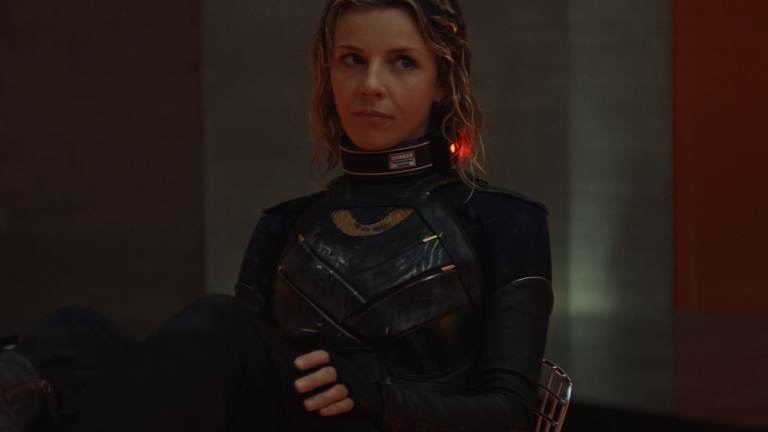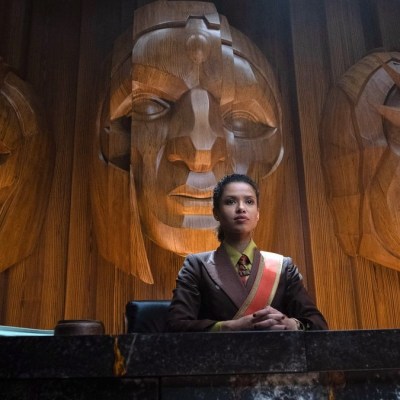Sylvie is the Secret Heart of Marvel’s Loki
Sophia Di Martino's prickly, ferocious Sylvie is the secret to Loki's success.

This article contains LOKI spoilers.
From the very start, the existence of Marvel’s Loki series has seemed more than a little suspect. Don’t get me wrong: If Tom Hiddleston wants to do a TV show, obviously you let him do a TV show, especially if it’s as one of the few genuinely complex and multi-faceted villains that the Marvel Cinematic Universe has managed to create over its decade-plus long march to power.
But the decision to tell a story about this version of Loki – one that stole the Tesseract following the Battle of New York and disappeared from the primary MCU timeline before the bulk of his redemption arc could really kick into gear – has always felt kind of like a cheat. And, in truth, it is precisely that: A way for Marvel to narratively have its proverbial cake and eat it too, mining the emotional drama of Loki’s earned death in Avengers: Infinity War without having to lose one of the most popular actors in its stable for good.
But as Loki continues, it’s becoming increasingly clear that this story isn’t even really about Loki at all. (Or at least not the one we know.) Thanks to the concept of Variants – different versions of familiar characters whose lives have diverged from their predetermined timeline in some way – our God of Mischief is technically not even the most interesting character in the show that bears his name.
Maybe it’s the fact that the Loki in Loki is a figure whose story we’ve seen play out once already before, or perhaps it’s because this version of the character is one who exists at one of the least complex and interesting points in his own narrative. (Oh, you tried to take over the Earth? How original.) But it’s easy to be both completely fascinated by and utterly grateful for the introduction of Sylvie, a mysterious female Loki variant who’s much more than she initially appears to be and who steals every scene in which she appears.
Part of that is, of course, due to actress Sophia Di Martino, whose sharp, prickly performance is every inch the equal of Hiddleston’s more chaotic one, but grounded in a simmering, purposeful rage that immediately sets her apart. (Even if there’s really no arguing that Hiddleston’s Loki is certainly going to be the more fun of the two to hang out at the bar with.) But it’s also because, in just the space of two episodes, Sylvie has firmly established herself as Loki’s most interesting character, a woman whose existence is part tragedy, part triumph, and part meditation on the very rules of the universe itself.
Though she may share some significant similarities with “our” Loki, (including an affinity for the color green), Sylvie is very much her own person, with plenty of agency and a clearly defined agenda of her own. She is not doomed to follow in Loki’s footsteps simply because they share an identity, rather she seems especially interested in striking out on her own path and following her own set of rules. It’s the only way she’s managed to survive as long as she has.
For starters, there’s the fact that she’s called Sylvie, a name that not only sets her apart by connecting her to Marvel Comics’ second Enchantress but one that it appears she chose for herself after purposefully rejecting the Loki moniker and everything that goes along with it. She’s dyed her hair blonde, broken one of the iconic horns off her headdress, and taught herself the sort of powerful enchantment magic our Loki would have given anything to be able to use himself back in The Avengers. (It’s a version of what he used the Mind Stone for, after all.) Sylvie’s a fighter, a survivor, and clearly every inch as smart as the trickster we know. But it’s the way her story deviates from Loki’s that makes her so compelling to watch – and essentially establishes her as Loki’s emotional center.
Born as the Goddess of Mischief on an Asgard that looks a lot like the one we know, Sylvie received a visit from the Time Variance Authority when she was just a child, charging her with crimes against the Sacred Timeline and essentially sentencing her to die. Though she escaped the TVA before she could be purged from the timeline forever, her entire life since has been spent on the run, being persecuted by a faceless group of bureaucrats who want to kill her for something that occurred when she was just a kid – the consequence of a decision she still can’t identify. (And which her persecutors no longer even remember.)
Sylvie grew up living in the literal shadow of death to stay alive, with worlds burning down all around her, no place she could call home, and few friends. (And if she somehow ever managed to make any, they were basically doomed to die pretty soon thereafter.) This is some pretty dark stuff for Marvel, and it’s hard not to feel sympathy for the nonstop nightmare her life has been up to this point. Particularly when compared to Loki, who has attempted genocide multiple times over the sort of family-driven angst that could probably be solved with a good therapist.
Though his time-looped interaction with Lady Sif forces Loki to confront the fact that his aggressive narcissism barely papers over the gaping emotional hole in his own soul, it’s difficult to argue that his inner sadness is enough to justify the terrible things he’s done to others. (Which, let’s face it, goes well beyond cutting off Sif’s hair.) And his various family issues pale in comparison to what Sylvie’s been forced to face, and she’s never tried to commit genocide or enslave a planet by way of acting out.
Yes, she’s controlled minds and killed multiple TVA agents and neither of those things are great from a moral perspective. But those are also the same people who considered her an aberration and wanted her dead, so on some level, it’s hard to blame her. Even her supposedly villainous plan to bomb the timeline and bring down the TVA isn’t about claiming their power for herself – which, let’s not forget was our Loki’s first impetus – it’s about finally getting the chance to rest for the first time since the home she knew was literally erased from existence. How can you not root for that in some way? Doesn’t she deserve a chance at something like peace?
Of course, your mileage may vary on how well you think Loki depicts Sylvie’s journey compared to Loki’s own, or the value that the world of the show attaches to each. But she is certainly treated more directly as a villain, at least in the show’s initial episodes. (From the moment Loki arrives at the TVA, Mobius is basically his cheerleader. Has Sylvie ever experienced something similar?) And yet, she’s still trying to free herself and her fellow Variants – who don’t even know they’re enslaved – from the rule of an organization that has never cared about any of them.
Sure, figuring out what’s up with an alligator sporting tiny Loki horns will undoubtedly be entertaining to watch. But it’s the conclusion of Sylvie’s story that looms as the most exciting part of Loki’s final two episodes – what does her life look like if she succeeds? If she can finally stop running? If the Time Keepers aren’t real and the TVA no longer has power over her or anyone like her? If she truly can be Sylvie for once instead of a doomed, somehow lesser version of Loki – that’s a future that looks pretty limitless to me.


